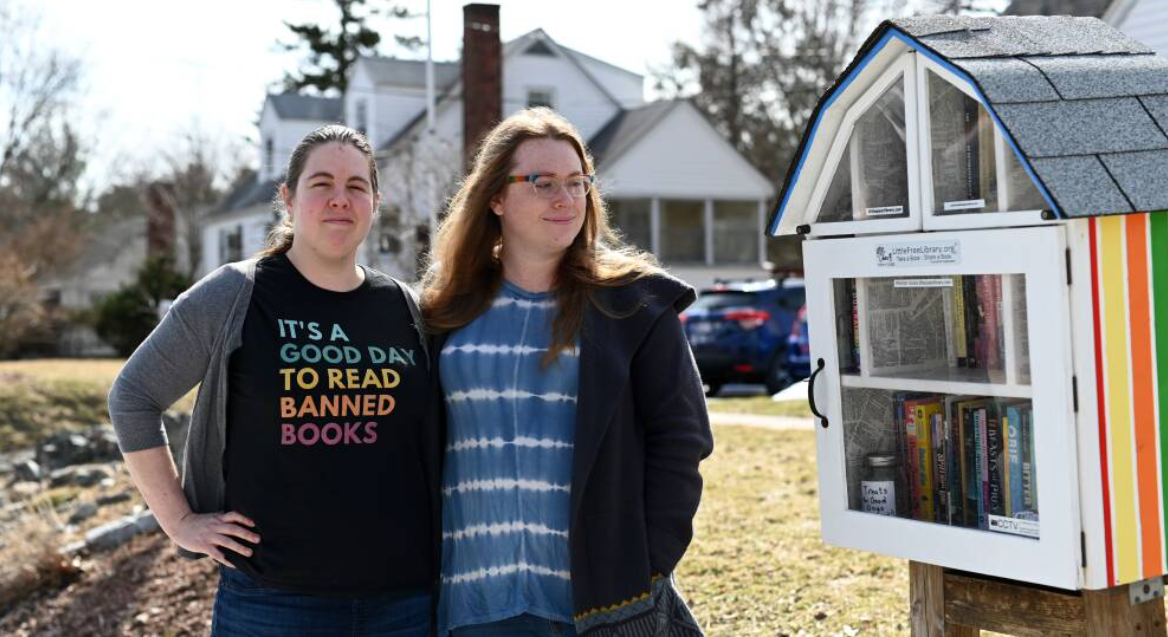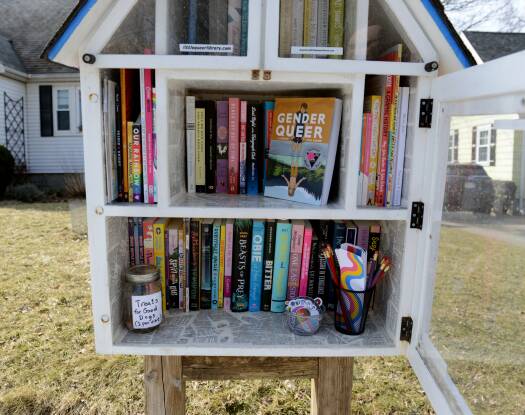The tale of missing Little Queer Library books and a failed book ban in Waltham, Mass.

Katie Cohen, left, and Krysta Petri, right, stand near the Little Queer Library that they host in front of their home in Waltham, Mass., on Mar. 15, 2022. (Meredith Nierman / GBH News)
File this story under political thriller.
The scene is a little free library, one of those community bookshelves that sprout up in yards, encouraging passersby to take or leave a book. Krysta Petrie and Katie Cohen host one on Trapelo Road in Waltham, Mass., dubbed the Little Queer Library, which offers mostly books featuring LGBTQ characters and themes.
On both Feb. 5 and March 6, home surveillance footage caught an older man taking armloads of children’s and young adult books from the library. The white-haired man wore a barn jacket and drove a Volvo. On a third occasion, a dark-haired woman was spotted carting off books.
Listen to the audio version of this story at WGBH.org.
The three incidents have made Petrie and Cohen suspicious.
“When there’s five or six little libraries in the area and the only one that is cleared out is a queer library, this very much feels like censorship, and if not legal theft — theft from the local queer community, where these books are no longer available,” Petrie said.
Larger questions about censorship are at play in this Massachusetts town and around the United States. The incidents at the Little Queer Library occurred around the same time Waltham’s School District received requests to have two books removed from its high school library: “This Book Is Gay” by Juno Dawson and “Genderqueer, A Memoir” by Maia Kobabe. The challenge also mirrors rising efforts in cities and towns across the country to ban those titles and others that focus on identity and social issues, including the Toni Morrison classic, “The Bluest Eye,” and the memoir “All Boys Aren’t Blue,” exploring the experiences of a Black queer boy.
Suzanne Nossel, CEO of PEN, a nonprofit that defends literary freedom, said the targeted books offer new and diverse perspectives, information about LGBTQ identities, Black history or race relations. She characterized the efforts as “neo-Puritan” attacks by conservative political groups with a broader political agenda.
“It’s a concerted push to suppress and withhold these narratives in school rooms, in libraries … and essentially hold back the tide of demographic change in this country,” Nossel said. “And so we see battles now in schools and libraries all across the country at a fast and furious pace.”
That includes Waltham, Massachusetts.
Last fall, Waltham resident Renee Arena submitted a complaint to the school library challenging “This Book is Gay” and “Genderqueer.” She told GBH News that some of the books’ content, including the images and descriptions of sex, is harmful to children. She said young people need to be protected from some of the graphic content in the books. Discussions about race and sex should be left to parents, she has said, not teachers.
“There are some parts that are educational,” she said of the books. “But my take is if you have a barrel of wine and you put a tablespoon of sewage in it, it becomes undrinkable. Who would want that?”
Arena, a former foster mother and Sunday school teacher, said anti-LGBTQ sentiment was not fueling her criticism. She objected to calling her effort a ban because both books would have remained available at the city’s public library.
“This Book Is Gay” has a chapter called “The Ins and Outs of Gay Sex” that contains descriptions and anatomical drawings of genitalia. It is not as controversial as “Genderqueer: A Memoir,” a graphic novel that contains drawings depicting over-the-clothes masturbation and other sexual acts.
Online booksellers have reached different conclusions about the appropriate age range for “Genderqueer,” some recommending it for age 15 and up, with others suggesting age 18 and up. They have not rated “This Book Is Gay.”
“It’s a concerted push to suppress and withhold these narratives in school rooms, in libraries … and essentially hold back the tide of demographic change in this country.”SUZANNE NOSSEL
Arena is increasingly visible in Waltham, where she ran unsuccessfully for School Committee last fall and called for reforming civics education and opposing mask mandates, among other issues. She and her husband, Tom, recently attended a South Shore meeting of Citizens Organized to Restore Rights, which says it is on a patriotic mission to rein in a government gone “out of control.” The Arenas handed out the group’s buttons at the gathering, according to video of the meeting posted on Twitter.
The group also has ties with Super Happy Fun America, which has a Woburn post office box. The organization bills that itself as “the most prominent conservative activist group in New England.” It opposes “gender madness” in schools and may be best known for organizing the “Straight Pride Parade” three years ago on Boston Common to counter the city’s Gay Pride Parade.
Arena would not say in an interview whether she is a member of either group, and Citizens Organized to Restore Rights did not reply to requests for comment. According to financial documents filed by her school committee campaign, her website was built by Mark Sahady of Malden, one of the men charged in the Capitol siege a year ago and a leader of Super Happy Fun America.
The book “Genderqueer” was also challenged by Deanna Vanaria, a Waltham grandmother. She called the images in the book inappropriate (and said she has no issues with “This Book Is Gay”). She cited a drawing in “Genderqueer” that illustrated the author’s fantasy about an apparent sexual act between an older man and younger man, one that is also on display in an ancient pottery exhibit at the University of Oxford.
“It’s not about the fact that it’s genderqueer,” Vanaria said. “It’s about the pictures. They’re not acceptable for anybody of that age to be looking at.”
The Waltham School Committee voted unanimously Feb. 16 to keep both books on the schools’ shelves, and it also agreed to place a warning on the cover of “Genderqueer: A Memoir” about its explicit content. Some supporters of the books noted that high school students can access pornography on their cellphones, if they choose.
Reba Tierney, a library teacher at Waltham High, said even though her book choices prevailed, at first the challenges left “a rock in the pit of my stomach.”
“I want to give them the benefit of the doubt,” Tierney said of the critics. “Maybe they genuinely think they’re protecting the children. I think they don’t realize how harmful their rhetoric and their viewpoint can be towards [LGBTQ] students.”

Books fill the shelves of the Little Queer Library in Waltham, Mass., on Mar. 15, 2022. (Meredith Nierman / GBH News
Rebecca Noyes, president of the Gender-Sexuality Alliance at Waltham High, who is a nonbinary student and uses they/them pronouns, said they read “Genderqueer” in one sitting.
“I couldn’t put it down,” Noyes said. “It was so freeing to see that there is someone else like me.”
That’s a sentiment shared by other students and local queer activists who don’t want to see the books restricted, and who were surprised to see opposition bubble up.
Josh Kastorf, an organizer of Waltham Pride, which has sponsored events for the LGBTQ community, said the emergence of groups like Citizens Organized to Restore Rights and Super Happy Fun America has made him uneasy. He grew up in Waltham and said anti-LGBTQ sentiment there is not new, but he worries it could become more socially acceptable.
“It’s not a lot of people in Waltham who feel this way,” he said. “But they could be very persistent, in, you know, normalizing these views in the community.”
Arena has also vowed to run again for School Committee, noting on Facebook that she received more than 2,000 votes in her November run for School Committee. She came in fourth, with the winner securing about twice as many votes or more.
Katie Cohen, one of the hosts of the Little Queer Library, said she thinks Waltham is a generally accepting place. The couple painted their Trapelo Road house and their Little Queer Library in matching rainbow colors. Occasionally someone will drive by and shout slurs at them while they work in their garden, but she said they’ve also received thank you notes for their activism.
“I think seeing that [positive representation] in the books that you read or in any other type of media you consume is just really important for feeling like you’re not broken in some way,” Cohen said.
Which brings us back to the case of the vanishing books at the Little Queer Library. Could the culprit have been someone who wanted to resell the books for cash? Or someone with more sinister motivations? No one is saying.
Waltham Police confirmed they were able to identify a person of interest in the case and returned a number of books to the couple. But the department offered no further details about who he was or what motivated that individual to take the books. A person cannot be liable for stealing books that are offered for free, they said.
“We continue to work with the owners to provide them with an appropriate resolution,” the department said in a statement.
Petrie and Cohen said as word of their library’s problem spread, the couple began receiving an outpouring of moral support and donations totaling more than $7,000.
They said that’s enough to keep the shelves stocked for months or years, if necessary.
